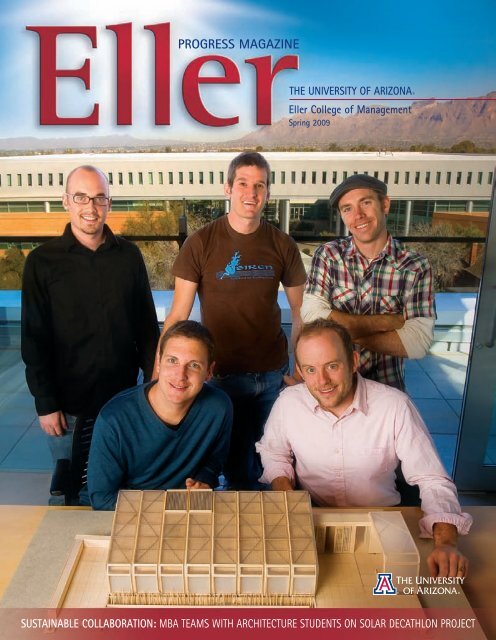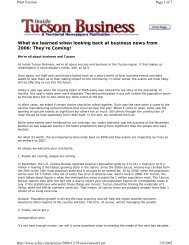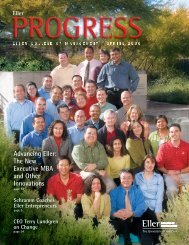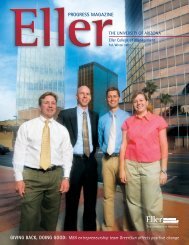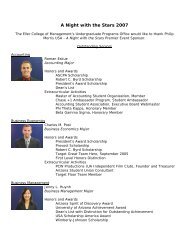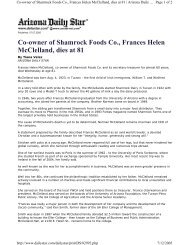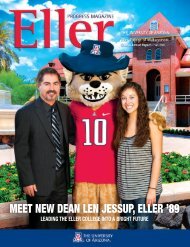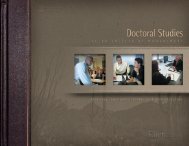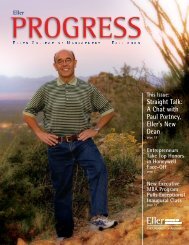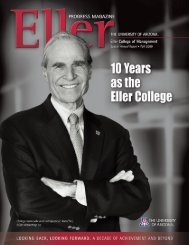PROGRESS MAGAZINE - Eller College of Management - University ...
PROGRESS MAGAZINE - Eller College of Management - University ...
PROGRESS MAGAZINE - Eller College of Management - University ...
- No tags were found...
You also want an ePaper? Increase the reach of your titles
YUMPU automatically turns print PDFs into web optimized ePapers that Google loves.
<strong>PROGRESS</strong> <strong>MAGAZINE</strong>THE UNIVERSITY OF ARIZONA ®<strong>Eller</strong> <strong>College</strong> <strong>of</strong> <strong>Management</strong>Spring 2009SUSTAINABLE COLLABORATION: MBA TEAMS WITH ARCHITECTURE STUDENTS ON SOLAR DECATHLON PROJECT
Access to aTOP-FIVE MIS PROGRAM…from the comfort <strong>of</strong> your home.Starting in fall 2009, <strong>Eller</strong> <strong>College</strong> <strong>of</strong> <strong>Management</strong>introduces new online security and informationassurance certification programsThe two-course series results in threeNational Security Agency Certifications:Information Systems Security Pr<strong>of</strong>essionalSenior Systems ManagerRisk AnalysisFor application details and more information, visit www.mis.eller.arizona.edu/online
Spring 2009P R O G R E S S M A G A Z I N EFrom the DeanTough economic times have away <strong>of</strong> prompting examination.How did we get here? How willwe get out? What can we do towe prevent the situation fromrecurring?Paul PortneyOf course there are no easyanswers. But these are the questions that will occupyeconomists and financial analysts in the years to come,and the challenge <strong>of</strong> finding answers will be taken up inbusiness schools around the country.Research at this level is one <strong>of</strong> the most importantcontributions that any business school can make; and, attheir best, these contributions influence how business isconducted globally. I am proud <strong>of</strong> my colleagues’ researchhere at the <strong>Eller</strong> <strong>College</strong>, and am also proud <strong>of</strong> theireffectiveness at achieving knowledge creation’s partnergoal—knowledge dissemination.It’s no surprise that at the <strong>Eller</strong> <strong>College</strong> we aim to provide agrowing number <strong>of</strong> undergraduate and graduate studentswith a top-notch education. It’s also not surprising thatthe current economic climate and declining state fundinghave stretched college resources considerably. How can wereconcile these conflicting goals?With several new initiatives, we are stepping up to do justthat. Our new, accelerated one-year MBA program leveragesexisting full-time program strengths. More undergraduatestudents are entering the pr<strong>of</strong>essional cohortthanks to our new summer in China program. And ourtop-five MIS program will launch online certificationclasses starting this fall.Optimism can be a tough sell in an economy like this, but Iam optimistic. In the coming months, I look forward toimplementing these new programs to serve a growingpopulation <strong>of</strong> students.Paul R. PortneyDean and Halle Chair in LeadershipFEATURE14 A Matter <strong>of</strong> Responsibility<strong>Eller</strong> Students Converge Around Topic <strong>of</strong> CSRBRIEFINGS2 Marketing Department Advances Student Experience with$10 Million Endowment3 <strong>Eller</strong> Expands Statewide Teacher Training Program in Economics4 Scholarship Established in Memory <strong>of</strong> Doctoral Student Steven Manos5 Grad Establishes Scholarship for B StudentsRESEARCH REPORT6 <strong>Management</strong> Pr<strong>of</strong>essor Examines Role <strong>of</strong> Stress in Team Performance7 MIS Pr<strong>of</strong>essor Secures Grant to Study Virtual TeamsINNOVATIONS8 <strong>Eller</strong> Adds One-Year Program to MBA Mix9 School <strong>of</strong> Public Administration and Policy Establishes New Evening MPA10 McGuire Entrepreneurship Program Establishes Ph.D. Minor11 New Real Estate Finance Track Open for MBA and MMF StudentsCONNECTIONS12 Undergraduates Will Take First Semester Cohort Classes in China13 <strong>Eller</strong> Pr<strong>of</strong>essor Uses Emerging Technologies to Promote LearningGATHERINGS22 Save the Date23 Distinguished Speaker SeriesALUMNI NOTES & PROFILES24 Pr<strong>of</strong>ile: Kevin Madden, BSBA ’8126 Pr<strong>of</strong>ile: Charles Nelson, BSBA Finance ’9227 Alumni NotesLAST WORD28 Last Word on…Corporate Social ResponsibilityCheryl P. Morley, BSBA Accounting ’76On the Cover: <strong>Eller</strong> MBA Benjamin Lyon volunteered to work with theUA Solar Decathlon competition team before his first semester <strong>of</strong> classeseven began. Lyon (seated, left) is pictured with fifth-year architecturestudents (from left) Peter Secan, Anton Toth, Eddie Hall, and facultyadvisor/principal investigator Matt Gindlesparger.Let Us Hear from You Please e-mail comments,questions, or feedback to progress@eller.arizona.edu.Manager <strong>of</strong> Marketing and Communications and Editor: Liz Warren-PedersonPublications Manager: Yvette Anchondo-Leyva • Photography: Thomas Veneklasen (unless otherwise noted)Design and Production: Shevon Johnson Design, Inc. • ©2009 The <strong>University</strong> <strong>of</strong> Arizona ®Contributors: Serida Fong, Eric Van Meter, Liz Warren-PedersonSPRING 20091
B R I E F I N G S}Thinking Forward:<strong>Eller</strong> marketing departmentadvances student experience with$10 million endowment initiative.Marketing faculty at the <strong>Eller</strong> <strong>College</strong> <strong>of</strong> <strong>Management</strong>.Last year, <strong>Eller</strong> <strong>College</strong> <strong>of</strong> <strong>Management</strong>marketing alumnus Marc Mutnansky (BSBAMarketing '08) boarded a private jet withEmerson executive vice president JayGeldmacher. Over four days, Mutnanskyshadowed Geldmacher on business tripsto Germany, Austria, and Scotland — a oncein-a-lifetimeopportunity for the newmarketing grad."It topped <strong>of</strong>f my experience at <strong>Eller</strong>," hesays. "I had the chance to see how real-lifebusiness decisions are made. I heard much <strong>of</strong>the vocabulary I had learned, and it mademe appreciate the education I received."Mutnansky's trip was exceptional, but notunusual: every year, <strong>Eller</strong> MBAs and undergraduatescompete for executive shadowing experiencesas part <strong>of</strong> the annual Thinking ForwardConference. The conference is just one <strong>of</strong> manyinnovative projects the <strong>College</strong>'s marketingdepartment has developed to expose studentsto the latest research and leading practionersin the field <strong>of</strong> marketing."These are the types <strong>of</strong> value-addedactivities that you typically find at privatecolleges," says department head Robert Lusch(BSBA Marketing '71 and MBA '72). "We wantto institutionalize these programs and expandopportunities for MBAs and undergraduates alike."To that end, the marketing department haslaunched a $10 million endowment initiative."The endowment will create a funding streamto support students, faculty, and programs,"Lusch says. Over the last several years, Luschhas brought together faculty who focus on theevolving, customer and service-centric model<strong>of</strong> marketing. Lusch, previously the chairperson<strong>of</strong> the American Marketing Association andeditor <strong>of</strong> the Journal <strong>of</strong> Marketing, notes thatit can take up to a decade for new informationto make it into a textbook; so it's vital toattract and retain research faculty who canbring it into the classroom right away.“The most compelling thing about thisendowment,” says Lusch, “is that all <strong>of</strong> the fundscontributed are being invested in people.”For more information on supporting The<strong>University</strong> <strong>of</strong> Arizona marketing department,contact Jane Prescott-Smith at 520.621.2301or jprescott@eller.arizona.edu2ELLER <strong>PROGRESS</strong>THE UNIVERSITY OF ARIZONA ®
Expanding Economics Education:<strong>Eller</strong> <strong>College</strong> expands statewide teacher training program in economics.By Eric Van MeterAsk a typical high school studentwhat "economics" is. She'll probablymention money, banking, jobs. Fromthose answers, it might seem thesubject has no place in core education,a specialty better left to buddingbankers and accountants.But economics isn't about money. It'sabout dealing with limited resources.When you begin to understand it asthe study <strong>of</strong> future consequences <strong>of</strong>choices we make today, it's clear why,beginning 2012, all Arizona high schoolstudents will be required to take a "capstone"economics course to graduate.But the new requirement throwsinto sharp relief the classic dilemma <strong>of</strong>economics: supply and demand. Arizonaschools fall far short in teachers qualifiedto teach economics.For decades, the <strong>Eller</strong> <strong>College</strong> hashelped remediate this deficiency withone or two summer courses for teachers,a lifeline supported by the ArizonaCouncil on Economic Education andfunded largely by the Thomas R. BrownFamily Foundation. Now, with sharplyspiking demand, the Department <strong>of</strong>Economics is moving into a boldphase two.Economics has tapped CathleenJohnson, vice director <strong>of</strong> the EconomicScience Laboratory, to direct the newOffice <strong>of</strong> Economic Education (OEE).The appointment reflects one newdimension to the bigger, better OEE:curriculum infused with experimentaleconomics, Johnson's area <strong>of</strong> expertise."When you put someone in anexperience, you don't have to try toconvince them <strong>of</strong> something. They cansee," Johnson says <strong>of</strong> teaching withexperimental economics. "If you wantthem to understand how pollutionpermits work, you have them be thepolluting factories and trade permits. Atthe end <strong>of</strong> the session, they look aroundand see that the firms that invested inclean technology reap the rewards."In a macro view, the new OEE willbe an ongoing experiment. Johnsonwill design pre- and post-testing forteachers who go through OEE classesand their students. For the first time,<strong>Eller</strong> <strong>College</strong> photothe OEE will generate data on whichconcepts and teaching methods "hit"and which need refinement. Over time,that information will migrate upwardsto the state and national councils oneconomic education.So while plans for the OEE evolve—with initial ideas ranging from graduateeconomics courses for non-<strong>Eller</strong>students to special workshops led byguest experts — Johnson firmly commitsto one plan that won't change: "We'regoing to be a very active center as faras innovating and dispersing whatwe learn."Office <strong>of</strong> Economic Education director Cathleen Johnson (with plaque) with L-R: Sarah BrownSmallhouse, Mark Sammons with <strong>Eller</strong>, Elizabeth Volard (president, Arizona Council onEconomic Education), Ruth Cooper (program director at TRBF), economics department headMark Walker, dean Paul Portney, and Mary Brown.WWW.ELLER.ARIZONA.EDUSPRING 20093
B R I E F I N G SJenny Hawkins photoSteven Manos, a doctoral student ineconomics, was also an endurancerunner. In June, while undergoing treatmentfor oral cancer, Manos’s motherand his fiancé and fellow graduatestudent, Jenny Hawkins, came acrossan interview he gave about running forhis undergraduate alma mater Seattle<strong>University</strong>’s newspaper.“His interview really summed upthe way he lived his life, from running,to graduate school, and everything inbetween,” Hawkins says. “He perseveredthrough the pain. He was an amazingindividual.”Steven Manos entered the <strong>Eller</strong><strong>College</strong> economics department as adoctoral student in fall 2005. “He wasa graduate student because he lovedeconomics,” Hawkins says. “He loved theresearch process and challenge.” Theymet at the pre-program math camp.“One day we went to Jim’s Greek Pati<strong>of</strong>or lunch and were talking aboutresearch ideas,” she says. “He named<strong>of</strong>f several <strong>of</strong> his own; he had economicquestions and wanted to find answersfor them. I was impressed.”Manos and Hawkins were assignedback-to-back cubicles in the economicsdepartment; they became studypartners, and then they fell in love.“Dates spent studying at our cubicles,a library, or a c<strong>of</strong>fee shop were lessthan romantic, but we loved workinghard toward our Ph.D. goal. We werefortunate to be able to spend somuch time together learning somethingwe love,” Hawkins says. WhenManos was diagnosed with oralcancer — at just 26 years old, andafter a lifetime <strong>of</strong> healthy living —Hawkins says, “we agreed from theday <strong>of</strong> his diagnosis we would fightas a team.”In July, Manos passed away, a shortten months after his initial diagnosis,but not before Hawkins was able totell him about a scholarship named inhis honor. The economics departmentcreated the scholarship to fund doctoralstudent travel to conferences.“It’s a great use <strong>of</strong> the money,”Hawkins says. “Steven was so passionateabout economics and loved to share hisideas.” Hawkins says Manos was deeplytouched to be honored in this way. SinceJuly, donations to the fund have topped$10,000 and are still growing.“Giving fellow classmates and friends,as well as future graduate students, theopportunity to list ‘Steven ManosScholarship’ multiple times in their CVsmakes me proud,” Hawkins says. “I’d loveto see that he made it possible for peopleto share their work. Graduate school andeconomics were Steven's life up until hegot sick, which makes the scholarship evenmore important to continuing the path hewas on. His goals for this life were cutshort by cancer, but the scholarship is oneway to honor and continue his passionfor economics and research.”To contribute to the Steven ManosScholarship Fund, contact Lana Sooterin the Department <strong>of</strong> Economics atsooter@eller.arizona.edu or 520.621.2821.Read more about Steven on his blog:http://stevenmanos.blogspot.com.4 ELLER <strong>PROGRESS</strong>THE UNIVERSITY OF ARIZONA ®
Above Average:<strong>Eller</strong> grad establishes scholarshipthat targets B students.By Serida Fong (BSBA Marketing ’09)Brad Sarn<strong>of</strong>f (right) with father Norton and brother David.John Morris photoBrad Sarn<strong>of</strong>f (BSBA Marketing ’98) says the <strong>Eller</strong> <strong>College</strong> largelydetermined where he is today, and he hopes to provide the sameopportunity to current students through the Brad Sarn<strong>of</strong>fScholarship. Sarn<strong>of</strong>f is currently the executive vice president <strong>of</strong>sales for his family’s business, Handi-foil <strong>of</strong> America, a manufacturer<strong>of</strong> aluminum foil containers, roll foil, and pop up sheets forthe food service and retail/supermarket industry.“I wanted to give back to the university that meant so much tome,” he says. The first scholarship will be awarded this spring to afull-time undergraduate student pursuing a BSBA, and who is ingood academic standing. Uniquely, the student must have a GPA<strong>of</strong> 3.0 to 3.5.Sarn<strong>of</strong>f considers himself the ultimate B student, and believesthat his involvement outside school helped him become a wellroundedperson. “With as many distractions as there are at aschool as wonderful as the U <strong>of</strong> A, it took it took me a year ortwo to get my footing as a student,” he explains. “After gettingused to the routine <strong>of</strong> student life and the rest that Arizonahas to <strong>of</strong>fer, I starting taking my future a lot more seriously.”Most scholarships, he says, are geared towards high-achievingstudents, but he wants to <strong>of</strong>fer opportunities to students who,like himself, “blossomed in their later years.” His scholarshipsupport will fund two students each year. Preference for thescholarships will be given to students with demonstratedfinancial need. Recipients will be selected by the undergraduatescholarship committee.Sarn<strong>of</strong>f attributes much <strong>of</strong> his success to his time in college.“It was the best four years <strong>of</strong> my life,” he says. “The <strong>University</strong> <strong>of</strong>Arizona provided an avenue for me to flourish in my business andpersonal life. I only hope that this scholarship can provide some<strong>of</strong> the same experiences that I was lucky enough to have at <strong>Eller</strong>.”For more information on supporting <strong>Eller</strong> <strong>College</strong> <strong>of</strong><strong>Management</strong> students through scholarships, contactJulie Trujillo at 520.621.2900 or jtrujillo@eller.arizona.edu.WWW.ELLER.ARIZONA.EDUSPRING 20095
R E S E A R C HR E P O R TGroups and teams <strong>of</strong>ten fall short <strong>of</strong> expectationsand fail to maximize their effectiveness.Associate pr<strong>of</strong>essor <strong>of</strong> management and organizationsAleksander Ellis is involved in a long-termresearch program to understand why.Using the Decision Behavior Laboratory, Ellisconducted a series <strong>of</strong> studies focusing on the role<strong>of</strong> stress. Ellis says the lab <strong>of</strong>fers a context thatcomplements the research questions he is interestedin answering because it allows him to manipulatestress in an isolated setting in which teammembers collaborate on a military simulation.“Teams <strong>of</strong> undergraduate students have a basicgoal to protect friendly airspace from enemycombatants,” he explains. “The video-game aspects<strong>of</strong> the task help get the students engaged andkeep them interacting with one another muchas they would as part <strong>of</strong> a project team inan organization.”According to researchers, teams should respondto some stressors (such as time pressure) positivelyand other stressors (such as role ambiguity) negatively.What is less well understood is how teamsrespond to combinations <strong>of</strong> these positive andnegative stressors. Along with graduate studentsMatt Pearsall and Jordan Stein, Ellis found thatteams respond to individual stressors as expected.Performance improves when the stressor is challengingand performance decreases when thestressor is seen as a threat.However, they found that positive stressors donot retain any <strong>of</strong> their positive qualities whencombined with a negative stressor. Instead, teammembers collectively appraise and cope with suchcombinations by avoiding the situation rather thantaking a problem-solving approach.According to Ellis, “This suggests a modified,inverted-U relationship between the level <strong>of</strong> stressand team performance. At low levels <strong>of</strong> stresswhen only one stressor is present in the environment,the type <strong>of</strong> stressor matters. At higher levels<strong>of</strong> stress, when multiple stressors are present, anythreat in the environment will color the appraisal<strong>of</strong> other stressors, no matter what type they are.”The final study in the series focused on therole <strong>of</strong> different types <strong>of</strong> stressors in teams andis currently being revised for possible publication.S T R E S S E D O U T :<strong>Management</strong> pr<strong>of</strong>essor examines therole <strong>of</strong> stress in team performance.Associate pr<strong>of</strong>essor Aleksander Ellis with graduatestudent Jordan Stein.“At high levels <strong>of</strong> stress,when multiple stressorsare present, any threat inthe environment willcolor the appraisal <strong>of</strong>other stressors.”<strong>Eller</strong> <strong>College</strong> photo6 ELLER <strong>PROGRESS</strong>THE UNIVERSITY OF ARIZONA ®
VIRTUALLY SPEAKING:<strong>Eller</strong> <strong>College</strong> photoMIS pr<strong>of</strong>essor secures grant tostudy virtual teams.Sue Brown“It’s a unique opportunityto observe real groupsin the real world to seehow virtual teamsemerge and evolve asthey work together.”Working with colleagues in another building, anothercity, or even another country is part <strong>of</strong> today’s businessenvironment, and technology is evolving to match.The National Science Foundation (NSF) has awardedassociate pr<strong>of</strong>essor <strong>of</strong> MIS Sue Brown and associatepr<strong>of</strong>essor <strong>of</strong> management Sherry Thatcher, <strong>of</strong> the<strong>University</strong> <strong>of</strong> Louisville, a two-year, $240,000 grant tostudy diversity and virtual collaboration. “This grant buildson the work we are doing in the iPlant Collaborative,”explains Brown, who is also the social science team leaderfor the collaborative. “It’s a unique opportunity to observereal groups in the real world to see how virtual teamsemerge and evolve as they work together.”The iPlant Collaborative is a five-year, NSF-fundedproject to bring scientists together around plant biology’s“grand challenge” questions. A critical component <strong>of</strong> thecollaborative is the involvement <strong>of</strong> scientists from manydisciplines. “In this study, we’re broadening the way weconsider diversity by examining perceived diversity as wellas objective differences,” Brown explains. “In addition togender, race, and age, we’re considering education level,background, and social factors — plus we’re looking atdisciplinary diversity.” The latter is especially importantto consider, Brown points out, because the iPlantCollaborative is part <strong>of</strong> a larger trend in science that iscreating large-scale, cross-disciplinary teams. “We allspeak different technical languages,” she says.As Brown and Thatcher follow the iPlant Collaborativeproject teams, they will use surveys to consider thingslike members’ perceptions <strong>of</strong> different media, i.e. phone,email, instant messaging. “There’s not a lot <strong>of</strong> research onindividual media predispositions,” Brown says. “We havesome evidence that there’s an age factor associated withmedia preference, but we are interested in what otherfactors come into play.” Brown says that in distancesettings, communication media help minimize the impact<strong>of</strong> some forms <strong>of</strong> diversity — for example, you might notrealize the team member you’re emailing happens to befrom another country. But it’s not clear if that has positiveor negative consequences for the team’s outcomes. Theresearch will help to answer that question.Brown says that, in addition to directly contributing tothe iPlant Collaborative’s understanding <strong>of</strong> what works fortheir project teams, the research could have application tothe NSF generally. It may also shed light on what works indistance education.“We know this research will provide insight intowhat works and what doesn’t in terms <strong>of</strong> virtual teams,”she says.WWW.ELLER.ARIZONA.EDUSPRING 20097
I N N O V A T I O N SA New Path to an MBA:<strong>Eller</strong> adds one-year program to MBA mix.By Eric Van Meterstock photoELLER ACCELERATEDMBA ELIGIBILITY• A business degree from anAACSB-accredited program• 3 or more years <strong>of</strong> pr<strong>of</strong>essionalwork experienceMore Info:accelerated_mba@eller.arizona.eduwww.ellermba.arizona.edu/accelerated<strong>Eller</strong> MBA students."Times have changed," says assistant dean <strong>of</strong> MBA programs TrinaCallie. "It's hard to compete without a master's degree now, andeveryone wants to speed things up."This reality inspired her to propose the <strong>Eller</strong> Accelerated MBA lastyear; the program is now slated for launch in the summer <strong>of</strong> 2010.The program adds another option to the <strong>Eller</strong> <strong>College</strong>'s MBA <strong>of</strong>ferings,which in recent years have grown to include the <strong>Eller</strong> Executive MBA,dual-master’s MBAs, and programs in Phoenix.Accelerated MBA students — who must have an undergraduatedegree in business — will complete the program in 12 months,beginning in summer with a "boot camp" refresher in the MBA core:statistics, operations, management, accounting, finance, marketing,economics, strategy, information technology, teams, and ethics.In the fall and spring semesters, students will essentially step intothe second half <strong>of</strong> the full-time program, taking electives alongsidestudents in their second year.By the end <strong>of</strong> the program, the students will have completed30+ credit courses with options to take the MBA internationaltrip and complete advanced field projects. The program also grantsaccess to the networking and career resources and events availableto all <strong>Eller</strong> MBAs.As a benefit to the <strong>Eller</strong> <strong>College</strong>, the Accelerated MBA will furtherdiversify the student body. "These one-year students will bring adifferent perspective to the classes and enhance class discussions,"Callie explains.Example: all one-year students will have been educated in traditionalbusiness disciplines, unlike 75 percent <strong>of</strong> <strong>Eller</strong>'s full-time MBAs.These students will also likely be "career enhancers" choosing an MBAto advance in their chosen field, whereas many <strong>of</strong> the full-time MBAstudents are completing an MBA to start a new career path. Callie alsohopes the program will draw more international students, noting thatthe standard European MBA program spans one year.Beyond its recruitment and diversity values, the Accelerated MBAjust makes sense. More and more, young pr<strong>of</strong>essionals want a careerboost without stepping out <strong>of</strong> work for two years. And while manyU.S. colleges already <strong>of</strong>fer similar programs, none <strong>of</strong> <strong>Eller</strong>'s short-listcompetitors <strong>of</strong>fer a one-year MBA.Perhaps best <strong>of</strong> all, the Accelerated MBA will boost efficiency <strong>of</strong>the <strong>Eller</strong> MBA overall. The bulk <strong>of</strong> the program taps unused capacity,taking advantage <strong>of</strong> the smaller-class second-year electives <strong>of</strong> thefull-time program.8 ELLER <strong>PROGRESS</strong>THE UNIVERSITY OF ARIZONA ®
Night School:School <strong>of</strong> Public Administration and Policy establishes new Evening MPA.Beginning this fall, the School <strong>of</strong> Public Administration andPolicy (SPAP) will <strong>of</strong>fer its full-time master <strong>of</strong> public administration(MPA) program exclusively in the evening. The change is in responseto growing demand from Southern Arizona’s public and nonpr<strong>of</strong>itleaders for pr<strong>of</strong>essional development opportunities.“The evening format opens up our highly-ranked MPA programto a significant public service workforce,” says H. Brinton Milward,associate dean and director <strong>of</strong> SPAP. “These are individuals whodon’t want to sacrifice work time while they return to school.” Thelatest U.S.News and World Report survey places the <strong>Eller</strong> MPAprogram at SPAP #36 nationwide and #7 in the west.Data from <strong>Eller</strong>’s Economic and Business Research Centerforecasts increased demand for public service employment through2015 — making public service one <strong>of</strong> the few sectors <strong>of</strong> the Arizonaeconomy to expect employment growth.“It’s becoming more and more difficult for people to take two ormore years <strong>of</strong>f work for graduate school,” Milward says. “With anevening program, they don’t have to. As an added benefit, thesepr<strong>of</strong>essionals will enrich the program by bringing their expertise tothe classroom.” Pr<strong>of</strong>essional attendees will come to the program withday-to-day knowledge <strong>of</strong> how principles can be applied in the workplace,and in turn, will be able to apply lessons learned in the programto their workplace right away. The program begins in fall 2010. Forapplication information, visit www.publicadmin.eller.arizona.edu/mpa.ELLER MPA ELIGIBILITY• Completed application packet• GREMore Info:padams@eller.arizona.eduwww.publicadmin.eller.arizona.edu/mpaH. Brinton MilwardWWW.ELLER.ARIZONA.EDUSPRING 20099
I N N O V A T I O N SFinancial Futures:<strong>Eller</strong> introduces real estate trackfor MBA and MMF students.Chris LamoureuxMBA and master’s <strong>of</strong> finance (MMF) students interestedin real estate have a new option — in fall, the <strong>Eller</strong> <strong>College</strong>finance department launched a focus track in that area.The program was developed in consultation with industryleaders, including Bourn Partners and Meritage Homes <strong>of</strong>Tucson and Vestar Development <strong>of</strong> Phoenix.“We designed a curriculum that is very much applied,with avenues for exploration such as visits to firms, aspeaker series, and a set <strong>of</strong> complementary classes sostudents can tailor their expertise and develop a broadunderstanding <strong>of</strong> the industry,” says finance departmenthead and Diamond Pr<strong>of</strong>essor Chris Lamoureux.Students in the track take a two-course sequence inreal property and real estate development plus electivecourses in areas such as sustainable development, localeconomic and community development, land use andgrowth controls, the land development process, or sustainabledesign and the Leadership in Energy and EnvironmentDesign (LEED) initiative. MBA students also work througha summer-long internship and MMF students complete athree-month practicum. The first graduates <strong>of</strong> the programwill enter the job market in 2010.“There’s no doubt that over the next 20 to 30 years,real estate will be a driver <strong>of</strong> growth and value in Arizona,”Lamoureux says. The state is expected to surge to apopulation <strong>of</strong> over 15 million by 2040, which could boostArizona into the top five most populous states in thecountry, according to the Economic and Business ResearchCenter at the <strong>Eller</strong> <strong>College</strong>.“As we worked with industry leaders to develop curriculum,we came to understand how entrepreneurial theirfirms are — no two are completely alike,” says Lamoureux.“We also discovered that people come to the field frommany different industries, and that an interdisciplinarybackground can be a significant pr<strong>of</strong>essional asset. Weplan to bring in a whole range <strong>of</strong> perspectives to addvalue to the program, and the entrepreneurial focusmakes sense for the <strong>Eller</strong> <strong>College</strong>.”The new real estate track is one <strong>of</strong> three areas <strong>of</strong>specialized study available to MBAs and MMF students. Thefixed-income track provides a unique, in-depth study <strong>of</strong>interest rates and the world <strong>of</strong> asset-backed securities; andthe corporate finance track familiarizes students with thedecision-making tools used by corporate finance leaders.10 ELLER <strong>PROGRESS</strong>THE UNIVERSITY OF ARIZONA ®
From the Lab to the Marketplace:McGuire Entrepreneurship Program establishes Ph.D. minor.Doctoral students in many disciplinesare working on some <strong>of</strong> the most promisingresearch projects on campus. Butthe rigors <strong>of</strong> their individual programspreclude them from taking part inentrepreneurial education, the vital nextstep in shepherding those research projectsinto the marketplace.“There is considerable demand toadvance scientific discovery into application,”explains Sherry Hoskinson, director <strong>of</strong>the McGuire Center for Entrepreneurship.“That is where any discovery reaches itsultimate value, be it social, environmental,or commercial.”The one-year McGuire EntrepreneurshipProgram is open to all UA students, butdoctoral students are challenged to findtime for the program in addition to theacademic demands <strong>of</strong> their own programs.The McGuire Entrepreneurship Programhas proposed a new Ph.D. minor so thatmore doctoral students can access entrepreneurialeducation as part <strong>of</strong> a formalprogram <strong>of</strong> study, and has applied forgrants which would incent more studentsto apply.“Doctoral students benefit from theentrepreneurship program in several ways,”says Hoskinson. “They can quantify thecommercial value <strong>of</strong> their own cuttingedgeresearch, illustrate its environmentalor social value, and come to understandthe legal framework <strong>of</strong> business andintellectual property.”The McGuire Center is seeking fellowshipfunding and developing partnerships withseveral units throughout The <strong>University</strong><strong>of</strong> Arizona.Pouria Valley (center) is a doctoral student in optical sciences;he brought his research in that area to the McGuireEntrepreneurship Program. He and teammates Yan An (left)and Jamie YuFang Huang (right) identified a promisingavenue for his innovation in the cell phone market.WWW.ELLER.ARIZONA.EDUSPRING 200911
C O N N E C T I O N SEllEr OvErsEas:Undergraduates to take first-semestercohort classes in China.The Cohort in China kicked <strong>of</strong>f in the fallwith a dinner event featuring traditionalChinese dancing and drumming.stock photoThe classes and faculty are the same, but the context iscompletely different: this summer, 50 <strong>Eller</strong> <strong>College</strong> studentswill take their first-semester cohort classes in Nanjing, China.“Students who are interested in international business can’tlearn about it just sitting in a classroom — they need toimmerse themselves in other cultures,” says Sue Umashankar,director <strong>of</strong> the Global Business Program at the <strong>Eller</strong> <strong>College</strong>.“We are <strong>of</strong>fering five classes abroad, so students can live andlearn in China while earning credits toward their degrees.”Over the course <strong>of</strong> eight weeks, the students will earn15 credits <strong>of</strong> upper division classes taught by <strong>Eller</strong> <strong>College</strong>faculty. The program is available to business management andmarketing majors who have been accepted into the pr<strong>of</strong>essionalphase <strong>of</strong> their <strong>Eller</strong> <strong>College</strong> education. There were originally35 slots for the program, but the college expanded the programto 50 in response to student demand. Accepted students willlive in a modern business hotel in downtown Nanjing fromMay to July while taking classes. Students will also participatein excursions to Shanghai and Beijing.“We have committed to holding this program in China fortwo years,” Umashankar says. “After that time, we couldexplore similar arrangements in other parts <strong>of</strong> the world —perhaps India or Brazil.”The program complements existing opportunities for<strong>Eller</strong> students to gain international exposure, including studytours, study abroad, and international internships.12 ELLER <strong>PROGRESS</strong> THE UNIVERSITY OF ARIZONA ®
Learning Virtually:<strong>Eller</strong> pr<strong>of</strong>essor uses emerging technologies to promote learning.By Serida Fong (BSBA Marketing ’09)As technology continues to progress,<strong>Eller</strong> pr<strong>of</strong>essors seek ways to translatetechnological advancements into learningopportunities. <strong>Management</strong> and Organizationslecturer Suzanne Delaney has donejust that for students in her statistics class,who created a Second Life experience fortheir classmates as an alternate means tolearn the class material.Second Life is a free, user-created 3Dvirtual community that anyone can accessonline. In Fall 2008, students in Delaney’sclass were invited to participate in theStudent Technology Preceptorship class t<strong>of</strong>urther explore emerging technologies andlearning opportunities with Second Life,Flash animation, and podcasting. TheStudent Technology Preceptorship, coordinatedby UA learning technology specialistWayne Brent, is a project-based coursewhere students learn and create real-worlddigital content for various universityprojects using dynamic websites, digitalvideo, virtual reality, and animation.Brent and Delaney collaborated to bring<strong>Eller</strong> students new learning options. “Wewere interested in creating something thatintegrated statistics with new technologiesthat students were curious about,” explainsDelaney. A dozen interested students signedup for the class the first semester.Delaney’s Second Life project is stillunder construction and continues to grow.Students using Second Life in Delaney’sstatistics class are able to engage in realtimechat with other students in the class,view videocasts and presentations <strong>of</strong>Delaney’s class lectures, and view instructionalFlash animations created by theStudent Technology Preceptors. “One <strong>of</strong> thethings the students like best,” says Delaney,“is that they gain a real sense <strong>of</strong> communityworking on the project. It’s great that theyare engaged in statistics in a fun virtuallearning environment.”“It’s a way to learn one topic from multipleangles,” says student Jordan Edris, wh<strong>of</strong>ocused on the Second Life component <strong>of</strong>the project. “The main goal was to makea place where students could get helpwith statistics.”Steven Loitz, who focused mainly on thecreation <strong>of</strong> the Second Life environment,had previous knowledge <strong>of</strong> the program andcommended the project. “It was great workingunder Pr<strong>of</strong>essor Delaney; everyone wasable have input on the project,” he says.“Now that we have established the foundation,it’s just going to get even better.”FIRST STEPS IN A NEW WORLDSecond Life is changing business paradigms,and <strong>Eller</strong> <strong>College</strong>’s Business CommunicationProgram is exploring how it may influencelong-distance team interaction, and how thoselessons apply to distance learning.This semester, teams <strong>of</strong> students in RobinBreault’s upper-division undergraduate businesscommunication course are using SecondLife as a meeting space to gauge its potentialto foster collaboration and camaraderie in theclassroom. “Second Life holds enormouspotential as an immersive virtual work spacefor teams,” says Diza Sauers, senior lecturerin <strong>Management</strong> and Organizations. “It’s ourgoal to prepare students to understand andcommunicate effectively; this is essentially anew communication medium.”The Business Communication programis currently designing online pr<strong>of</strong>essionaldevelopment courses that maximize learningthrough use <strong>of</strong> virtual environments.Scenes from the <strong>Eller</strong> <strong>College</strong>’sSecond Life presence.WWW.ELLER.ARIZONA.EDUSPRING 200913
F E A T U R EDean Paul Portney with undergraduate students.14 ELLER <strong>PROGRESS</strong>THE UNIVERSITY OF ARIZONA ®
a matter <strong>of</strong> responsibilityThere is little debate that corporate socialresponsibility (CSR) can be behind attention-gettingcampaigns for social good. Consider the (RED) series<strong>of</strong> consumer goods partnerships, which raisemoney for the Global Fund to Fight AIDS. Or GE’sEcomagination campaign, which highlights thecompany’s green initiatives.But CSR is far from simple or clear-cut. The termitself has no standard definition. Is it philanthropicgiving? Gifts in kind? Operations-level sustainabilityinitiatives? Production <strong>of</strong> healthy or environmentallyfriendlyproducts or services?One thing is clear: if the purpose <strong>of</strong> business isto generate pr<strong>of</strong>its, then whatever CSR initiatives acompany institutes must also be compelling to shareholders— especially in times <strong>of</strong> economic downturn.At the <strong>Eller</strong> <strong>College</strong> <strong>of</strong> <strong>Management</strong>, ethics andresponsibility are topics for discussion in a variety<strong>of</strong> forms. The Raymond Spencer Program <strong>of</strong> AppliedEthics seeks to understand how ethics diffusethrough organizations. Students on the <strong>Eller</strong> Board <strong>of</strong>Honor and Integrity reach out to regional high schoolstudents through the High School Ethics Forum,expanding this year to Scottsdale. Paul Melendez,director <strong>of</strong> <strong>Eller</strong> <strong>College</strong> ethics programs, hosted aday-long workshop for public sector employees inMarch. This year’s Thinking Forward Conference,which brings together corporate leaders and marketingstudents, revolved around the theme <strong>of</strong> CSR. Andthe <strong>Eller</strong> MBA chapter <strong>of</strong> Net Impact brought seniorleadership from American Honda, APS, and Monsantoto engage students in a healthy debate on CSR.WWW.ELLER.ARIZONA.EDUSPRING 200915
F E A T U R EresponsibleresearchLast year, <strong>Eller</strong> <strong>College</strong>dean and Halle Chair in LeadershipPaul Portney published a review paperon corporate social responsibility,“The (Not So) New Corporate SocialResponsibility: An Empirical Perspective,”in Review <strong>of</strong> Environmental Economicsand Policy. <strong>Eller</strong> Progress checked in withthe dean to gather insight fromthe field.<strong>PROGRESS</strong>: How do you definecorporate social responsibility (CSR)?PAUL R. PORTNEY: This isn’t as easy todo as it may seem. Some people defineCSR to mean things that a company doesthat it’s not required to do (e.g., reduceits pollution more than the EPA requiresit to do). But that still allows for caseswhere a company may do this to increaseits pr<strong>of</strong>its (by currying favor with itscustomers, workers, or investors, say).Others define CSR as only those thingsthat a company does that it knows won’tpay <strong>of</strong>f in the bottom line.16 ELLER <strong>PROGRESS</strong>THE UNIVERSITY OF ARIZONA ®
<strong>PROGRESS</strong>: Your paper indicates thatthe phenomenon <strong>of</strong> CSR is not new,but the term is. What has changedabout the way that companiesapproach CSR and the way consumersregard it?PRP: What’s changed is that companiesnow realize that their stakeholders<strong>of</strong>ten breathe down their necks everybit as much as their shareholders. Forthat reason, they are trying to takecredit for the good things they havealways done; they’re also thinking moreabout new things to do to “green up”their reputations.<strong>PROGRESS</strong>: What motivation docompanies have to engage in“beyond-compliance” programs?Are these programs paying <strong>of</strong>f?PRP: Some firms believe that theirbeyond-compliance activities will pay<strong>of</strong>f in higher pr<strong>of</strong>its; others find CSR tobe a nuisance, but one that they haveto deal with given evolving attitudeson the part <strong>of</strong> some about the role<strong>of</strong> corporations.<strong>PROGRESS</strong>: Can you summarize thefindings on investment funds thatscreen for CSR?PRP: The studies that have attemptedto link some measure <strong>of</strong> CSR (there aremany) to some measure <strong>of</strong> financialsuccess were recently surveyed andre-analyzed. The conclusion was thatafter looking at nearly 150 suchstudies, CSR may be very slightlycorrelated with financial performancein a positive and statistically significantway. The authors also conclude,however, that the effect is so smallthat firms might better spend theirtime thinking about other ways toenhance pr<strong>of</strong>itability.<strong>PROGRESS</strong>: Your paper suggeststhat, particularly with regardsto “green” initiatives, CSR canamount to a marketing strategy.How skeptical should the averageconsumer or investor be about firmsthat tout their commitment to CSR?PRP: Customers or investors ought tomaintain a healthy skepticism aboutfirms that boast <strong>of</strong> their “greenness.”Remember what has happened to BP,the company formerly known asBritish Petroleum, but which over thelast decade or so began calling itself“Beyond Petroleum” to connote itsenlightened position on the environment,worker safety, and so on. Itbecame the darling <strong>of</strong> environmentaland other social advocates, at leastuntil an explosion at one <strong>of</strong> its Texasrefineries not only killed a dozen or sopeople but also revealed that it hadbeen cutting corners on safety at theplant for some time. On top <strong>of</strong> that, ithad suffered serious leaks from an oilpipeline that was not being properlymaintained and inspected. Any goodwillthat BP had gained has all beendissipated, and then some.UnderstandingUnethical Behaviorin GroupsAs part <strong>of</strong> his research into groupsand teams, associate pr<strong>of</strong>essor <strong>of</strong>management and organizationsAleksander Ellis [see Research Reporton page 6 ] is examining the propensityfor groups to behave unethically— specifically, whether psychologicalsafety influences the frequency<strong>of</strong> unethical behavior.“The literature suggests thatpsychological safety is beneficial togroups, representing the level <strong>of</strong>comfort among group members interms <strong>of</strong> interpersonal risk taking,”Ellis says. “But, certain individualshold ethical orientations that aremore likely to view cheating asacceptable. When those individualsare operating in a group with highlevels <strong>of</strong> psychological safety, the risk<strong>of</strong> cheating may greatly increase.”Ellis and graduate student MattPearsall gave student groups anethical decision to make by providingan easy opportunity for them tocheat. Results indicated that, forcertain individuals, being in a groupwith high levels <strong>of</strong> psychologicalsafety significantly increasedcheating on the task.WWW.ELLER.ARIZONA.EDUSPRING 200917
F E A T U R EC E O r o u n d t a b l e“You always try to be responsibleto the community in whichyou operate, but you have todo so within your means. If youcan give back, you do, but ifthe company isn’t doing aswell, you have to cut back. Intimes <strong>of</strong> economic hardship, itcan be difficult: you can’t giveif you’re not pr<strong>of</strong>itable. Themost important thing in my lifeis integrity, and if you can’tgive financially, you canalways give your time, andencourage your employees todo the same.”KARL ELLERBSBA Marketing ‘52Founder and CEO,The <strong>Eller</strong> Company“As the global leader in thetoy industry, we believe thathow we achieve success isjust as important as thesuccess itself. From productsafety and workingconditions in our plantsto corporate governanceand philanthropy, ourcommitment to corporateresponsibility alignswith our company’s corevalues and resonatesin our actions eachand every day.”ROBERT ECKERTBSBA Marketing ‘76CEO, Mattel Inc.“In the broad context, we tryto be good citizens. Many <strong>of</strong>our executives are involvedin philanthropic boards, andwe encourage our leadershipto do so. We also have agreen building program andour houses have EnergyStar certification. It’s reallyimportant for the peoplewho work for you to be <strong>of</strong>good character, to be exemplarycitizens. We’re sellingproducts that appeal to thebuying public, and theywant to buy from goodcorporate citizens.”STEVE HILTONBSBA Accountingand Real Estate ‘83CEO, Meritage Homes18 ELLER <strong>PROGRESS</strong>THE UNIVERSITY OF ARIZONA ®
CSR initiatives take many forms. <strong>Eller</strong> Progress checked in with alumniat firms in a variety <strong>of</strong> industries to see what they’re doing, how theyapproach CSR in a challenging economy, and why it’s important.“What comes to my mind isthe idea <strong>of</strong> giving back to thecommunity and involvement incharitable causes. We givemoney and tonnage <strong>of</strong> food tocommunity food banks, andwe have a corporate budgetfor charitable requests which Isee personally. But our firstresponsibility is to make asmuch money as we can; tocreate new jobs throughreinvestment; to investin innovation.”NORMAN MCCLELLANDBSBA IndustrialLabor Relations ‘49Chairman, ShamrockFoods Corporation“When we talk about corporateresponsibility, we talk aboutpursuing a business strategythat’s responsible in the shortand long term, focused onthree primary areas: entrepreneurship,and supportingstart-up companies; education,through programs like theErnst & Young AccountingCareers Awareness Programthat we sponsor at the <strong>Eller</strong><strong>College</strong> for disadvantaged highschool students; and sustainability,by working to minimizeour impact on the environmentand our carbon footprint.”RON BUTLERBSBA Accounting ‘91Senior Vice President,Ernst & Young“Corporate social responsibilityis just part <strong>of</strong> being a goodpartner in your community. Too<strong>of</strong>ten, it’s tied to dollars instead<strong>of</strong> allowing time for employeesto get involved in things thatmean something to them,whether that’s a church or asynagogue or whatever is nearand dear to their hearts.Companies should allow timefor employees to give back. It’spart <strong>of</strong> being a good person,<strong>of</strong> leading a good life.”BRIAN LESKBSBA Business ‘80CEO, DiversifiedHuman ResourcesWWW.ELLER.ARIZONA.EDUSPRING 200919
F E A T U R EsustainableinvolvementBenjamin Lyon (left) andMatt Gindlesparger.“I picked up a newspaperand read about the SolarDecathlon project. Theywere looking for businessstudents to get involved,and I have a backgroundin building materialssales. I gave them a call,met with Matt, and theybrought me on.”— Benjamin LyonFirst-year MBA BenjaminLyon came to the <strong>Eller</strong> <strong>College</strong> planningto get involved, but the speedat which it all came together tookhim by surprise.Shortly after arriving in Tucson, heand his wife were browsing at the17th Street Market. “I picked up anewspaper and read about the SolarDecathlon project,” he says. “Theywere looking for business studentsto get involved, and I have a backgroundin building materials sales. Igave them a call, met with Matt[Gindelsparger, principal investigator],and they brought me on.”The Solar Decathlon is an invitation-onlyinternational competitionsponsored by the U.S. Department<strong>of</strong> Energy every two years. The<strong>University</strong> <strong>of</strong> Arizona is one <strong>of</strong> twentyschools — and the only school inthe Southwest — tasked withdesigning and building a completelysolar-powered, 800-square-foothome. The structure is under constructionnow, and will be reassembledon the National Mall inWashington, D.C. in October.“I’m helping with fundraisingstrategy,” Lyon explains. The team iscomprised <strong>of</strong> students from architecture,engineering, material sciences,agriculture, landscaping, andplanning. “The project has significanttravel costs, since the dwelling willneed to be transported by truck ortrain and then fabricated onsite by ateam <strong>of</strong> students,” Lyon says.The Solar Decathlon project alsoties into Lyon’s activities with the<strong>Eller</strong> MBA Net Impact chapter. “NetImpact is an international nonpr<strong>of</strong>itorganization out <strong>of</strong> San Franciscothat gives business students anavenue to use their skills to improvesociety,” Lyon says. stepped up tolead the <strong>Eller</strong> chapter <strong>of</strong> Net Impactwith second-year MBA CyrusKhosh-Chashm.One <strong>of</strong> their first projects was tohost a panel on CSR featuring CherylMorley <strong>of</strong> Monsanto, Edward Fox <strong>of</strong>APS, and David Raney <strong>of</strong> AmericanHonda. [see page 28 for a Q&Awith Morley].“The <strong>Eller</strong> chapter <strong>of</strong> Net Impactsupports three primary activities,” Lyonsays. “The first is a campus sustainabilityinitiative, the second is micr<strong>of</strong>inance,and the third is curricularchange.” The <strong>Eller</strong> chapter focusedon the third issue, and developed aquestionnaire to find out what types<strong>of</strong> new elective courses appealed totheir peers. They identified demand fora course in sustainability, which deanPaul Portney and SRP Pr<strong>of</strong>essor <strong>of</strong>Technology, Public Policy, and MarketsStan Reynolds are developing forspring ’10.It’s an ambitious agenda to take onwhile working through the first year <strong>of</strong>the MBA program. “I wanted to contributeon a large scale,” Lyon says.“And everything has just worked out.”For more information about the UA’sSolar Decathlon team, or to support theteam, visit www.uasolardecathlon.com.New! <strong>Eller</strong> introduces dualMBA/Master <strong>of</strong> Planning degreeA new MBA/ MS Planning degree isavailable for students interested inbusiness and policies development,green building, land and resourceuse, and regional planning. For details,visit http://mba.eller.arizona.edu/dual/.20 ELLER <strong>PROGRESS</strong>THE UNIVERSITY OF ARIZONA ®
international aidRising unemployment makes job hunting a tough propositionfor skilled workers who already know how to use thesystem. For political refugees newly arrived in the U.S., thechallenges can appear insurmountable.After volunteering for the last year with refugee familiesin Tucson, management senior lecturer Cindi Gilliland cameto see first-hand the odds stacked against them as theystruggle to make ends meet after limited state sponsorshipexpires. “There’s one family in particular I’ve really gotten toknow,” she explains. “I described the family’s plight to one<strong>of</strong> my classes and asked them to let me know if they heardabout any job opportunities.”Jason Mighdoll, president <strong>of</strong> the Students in FreeEnterprise club, was in the class. “Part <strong>of</strong> their goal is tomake a difference in the world,” says Gilliland. “The clubwas looking for a project, and they voted unanimously todevelop a program to help refugees find jobs.”On February 6, the club hosted a kick<strong>of</strong>f meeting at which15 refugees were each paired with a student mentor for thefirst <strong>of</strong> a series <strong>of</strong> four employment workshops. The studentsworked with refugees to help identify childcare and transportation.Following the first session, each was charged withhomework <strong>of</strong> finding a nearby library, learning to access theinternet to search for jobs, and filling out two applications.“The hope is that the workshops will result in the refugeesfinding employment, but it’s also an important way for themto develop friendships and make connections in the community,”says Gilliland.Over the course <strong>of</strong> the semester, Gilliland says that thestudents will conduct three sets <strong>of</strong> the employment workshops.And there is no shortage <strong>of</strong> student volunteers forthe project: 60 students from Gilliland’s management 310Aclass are earning extra credit by pairing up with refugee jobseekersin the second and third sessions <strong>of</strong> the program, andan additional 60 students are working to create a refugeejob fair scheduled for May 2 at McClelland Hall. “We’re justputting all <strong>of</strong> this energy and enthusiasm to work,” she says.Cindi Gilliland photoCindi Gilliland with studentsPriyanca Kotwal and Meg Hawley.Employers interested in participating in the refugee job faircan contact Cindi Gilliland at cgill@eller.arizona.edu.WWW.ELLER.ARIZONA.EDUSPRING 200921
G A T H E R I N G S G A T H E R I N G S G A T H E R I N G SSave theD ATEMIDYEAR ECONOMIC UPDATEThursday, June 18, 7:00 a.m. at the DoubleTree Hotel Reid Park, TucsonJoin us for breakfast as UA economists Marshall J. Vest andGerald J. Swanson review the national, state, and metro economies atthis must-attend event. Reservations required.For information, visit www.eller.arizona.edu/outlook.PROFESSIONAL ADMISSION INTERVIEWSaturday, September 26, 7:00 a.m. at McClelland HallVolunteer to interview undergraduate students preparing to enterthe pr<strong>of</strong>essional phase <strong>of</strong> their <strong>Eller</strong> <strong>College</strong> education.Sign up to volunteer at www.eller.arizona.edu/eca.TECHNOLOGY MANAGEMENT AWARDS LUNCHEONFriday, October 16, Phoenix-area location TBAJoin the <strong>Eller</strong> <strong>College</strong> <strong>of</strong> <strong>Management</strong> and the <strong>College</strong> <strong>of</strong> Engineeringas they honor exemplary leaders who operate at the intersection<strong>of</strong> technology and business.HOMECOMING 2009Friday and Saturday, November 6-7 at the UA CampusReunite with the <strong>Eller</strong> <strong>College</strong> <strong>of</strong> <strong>Management</strong> and celebrate Homecoming 2009.Learn more and register online at www.eller.arizona.edu/homecoming.22 ELLER <strong>PROGRESS</strong> THE UNIVERSITY OF ARIZONA ®
2 0 0 8 - 2 0 0 9D I S T I N G U I S H E D S P E A K E R S E R I E SConnecting students with industry leaders.MARIA BARTIROMOOn March 5, CNBC host Maria Bartiromojoined dean Paul Portney, students, andcommunity members for an informalconversation on the currenteconomic situation.WWW.ELLER.ARIZONA.EDUSPRING 200923
A L U M N I N O T E S &P R O F I L E SEntrepreneurial DeterminationKevin Madden, BSBA '81CEO, Madden MediaBy Eric Van MeterA L Upr<strong>of</strong>ileM N IKevin Madden photoKevin MaddenPerhaps it’s something aboutgrowing up under the Montana sky,all that open blue inspiring thoughts<strong>of</strong> freedom, possibility. Kevin Maddenwas an entrepreneur long before hestruck out for The <strong>University</strong> <strong>of</strong>Arizona. Of course there was shovelingsnow and mowing lawns as a kid.Later, a business building homes.Even a stint felling toweringLodgepole pines, trees he'd heftunder one arm and drag from theforest on foot. Not easy, but goodpractice for any entrepreneur—ittakes determination and sweat tobuild a business.That business had humble beginnings.Madden spent a short time inCalifornia selling ads for yellow-pagelistings. But the gig took him too farfrom Tucson, which he'd grown to love,and too far from Jill, then girlfriend,now wife, mother <strong>of</strong> their three daughtersand partner in building and runningMadden Media.So Madden returned to Tucson. Itwas 1982. The country had hit recession,jobs were scarce. But developerswere scraping ground for what's nowthe Hilton El Conquistador Golf &Tennis Resort. Madden thought aboutthe people who'd stay there. Hethought about selling ads in California.He knew he wanted to be his own boss.K A N S A S C I T Y ' S O F F I C I A L V I S I TO R G U I D E • K A N S A S C I T Y G R O U P PAC K AG E P L A N N E R • VA L L E Y G U I D EGREATER PHOENIX OFFICIAL VISITORS GUIDE • MEETING & TRAVEL PLANNER GUIDE FOR GREATER PHOENIXPHOENIX AREA MAP • ST. LOUIS OFFICIAL VISITORS GUIDE • TUCSON GUIDE • TUCSON OFFICIAL VISITORS GUIDET U C S O N D E S T I N A T I O N P L A N N I N G G U I D E • T U C S O N C I T Y M A P • T U C S O N N E W C O M E R S G U I D ETUCSON HOME • ARIZONA: THE GOLF STATE • OFFICIAL ARIZONA GOLF GUIDE & DIRECTORY ADVERTISER INDEX24 ELLER <strong>PROGRESS</strong>THE UNIVERSITY OF ARIZONA ®
When he put it all together, he, Jill,and a friend spent the next weekpatching together a demo visitormagazine/directory."I'd go to Buffalo Exchange, buypolos and khakis and drive around inmy '68 VW bug trying to sell ads withthis mockup we photocopied atAlphagraphics," Madden recalls, "inAugust. With no A/C." (Remember thatbit about sweat?) But the idea had legs,ads sold, hotels got on board and thatJanuary, 1983, Tucson Guide was born.The rest, as they say, is history. Theyentered the Phoenix market, begansweeping local media competitions.Specialty publications followed. In theearly 90s, Madden launchedArizonaGuide.com, a frontrunner inonline travel/tourism info. Then, in2003, the company acquired PreprintPublishing, specializing in travelfocusednewspaper inserts, andbecame Madden Media, the country'slargest destination marketing business:15 publications, extensive emediaservices, and inserts reaching 110million readers a year.The strategy behind the Maddens’success isn't complex: find a need, andwhile you're meeting it, find the next;do what you know, but stay at thecrest <strong>of</strong> technology; evolve. And whileMadden humbly says, "I had less to dowith it than others," it's determinationthat's kept him at the helm <strong>of</strong> thecompany that puts everywhere elseon the map. From that post, he <strong>of</strong>fersthis advice:"For anyone who has the urge to bean entrepreneur, I say do it. And startyoung. It's easy to work 100 hours aweek when you're young. When you'reolder, you suffer. Your family suffers.It's easy to be young and poor. It'sa lot harder to be old and poor. But ifyou're wondering, should I do it? Yes,you should."WWW.ELLER.ARIZONA.EDUSPRING 200925
A L U M N I N O T E S &P R O F I L E SSprinkles on TopCharles Nelson, BSBA Finance ’92Co-Founder and President, Sprinkles CupcakesA L Upr<strong>of</strong>ileM N ICharles NelsonIn 2006, Charles Nelson, his wifeCandace, and his brother lugged 400cupcakes across the country. “We couldn’tcheck them on the plane, and we eachhad 140 cupcakes in these huge cases —we just had to stuff them in the overheadbins,” he says.It sounds like madness, but what elsecan you do when Oprah invites you onher show with less than a day’s notice?The business Nelson and his wifeco-founded, Sprinkles Cupcakes, wasan <strong>of</strong>ficial hit.From a young age, Nelson always hadthe entrepreneurial bug — but he neverimagined himself helming a cupcake bakery.“My father was the president <strong>of</strong> abank,” he says. “I was always enamoredCharles Nelson photowith Wall Street. I was the only kid in mytenth grade to rush out and see WallStreet with Michael Douglas.”He came to The <strong>University</strong> <strong>of</strong> Arizonafrom Oklahoma City and earned hisundergraduate degree in finance. Fromthere, he joined a public finance firm inhis home town. “After a year and a half, Iwas up for bigger challenges,” he says. “Iapplied to business schools and got intoto the MBA program at Darden.” He completedan internship with Morgan Stanley,working in mergers and acquisitions andIPOs, including the Netscape IPO. Aftergraduation, he took a position with AlexBrown & Sons in San Francisco. “TheInternet was really emerging,” he says. Hejoined secondspin.com, and then, in 2001,he got married and started his ownconsulting firm.“My wife had followed a parallel pathin investment banking,” he says, “But shealways loved baking, and her greatgrandmotherhad owned restaurants inSan Francisco.” Candace decided to go topastry school, and after she finishedschool, she began a business selling cakesout <strong>of</strong> their home. “Even her best customersdidn’t need more than one or twogourmet cakes a year,” Nelson says. “Westarted to wonder, why don’tpeople make cupcakes with the bestingredients? Belgian chocolate, realchocolate sprinkles, great flavors withnatural zest?”When the Internet bust began to hit,the Nelsons left the Bay Area to makea change. They spent a year and a halfdeveloping cupcake recipes and creatinga clean, modern brand in consultationwith an Austrian art director. “Weopened the first store in Los Angeleson April 13, 2005,” he says. “The daywe opened, we sold out in two hours.We had 200 cupcakes — and those tooka long time to make! We could onlymake two dozen a batch — but peoplewere buying two dozen at a time.” Overthe next year, they got their operationsunder control, and then they got thecall from Oprah’s show.“We started getting calls from allover the country,” Nelson says.Sprinkles doesn’t ship, but the coveragehelped set the stage for further expansion.They have since opened stores inNewport Beach, Dallas, Scottsdale, andPalo Alto. Two years ago, WilliamsSonoma stores around the countrybegan selling Sprinkles cupcake mixes.“Investment banking is project driven,but your own business is ongoing.It’s a living, breathing being — and itdoesn’t seem like work,” he says. “Welove what we do. We started with fourpeople, and now we have 241 people,with the original four still there. It’sbeen an amazing 3-1/2 years.”26 ELLER <strong>PROGRESS</strong>THE UNIVERSITY OF ARIZONA ®
News FROM ALUMNIUpdate your contact information and tell us what’s new: progress@eller.arizona.edu.1970sSteven Rousso ’79 BSPA ’83 MPASteven is co-founder and senior partner with HFSConsultants, a management consulting firm for thehealthcare industry.1990sApril Bourie ’99 MBAApril is tourism sales manager with the MetropolitanTucson Convention & Visitors Bureau. She and herhusband are expecting twins in August 2009.Kevin Kraus ’99 MBAKevin is director <strong>of</strong> marketing at Ventana MedicalSystems. He and his wife Heather (also ’99 MBAwith Ventana) are expecting their second baby inJuly 2009.2000sShannon Aichele Zock ’00 BSBABusiness <strong>Management</strong>After graduating, Shannon joined Lockheed inDenver. Eventually marriage and her passion forearly childhood education took her to the Midwestwhere she earned her MA in teaching. She hastwo young daughters, Adrianna and Alexandra(pictured above).Ge<strong>of</strong>f Ball ‘02 BSBA <strong>Management</strong>Ge<strong>of</strong>f is currently executive vice president <strong>of</strong>sales and a partner in the private portfoliolending firm Landmarc Capital & InvestmentCompany.Pearl Bailey ’03 BSBA MarketingPearl is now going on her fourth promotionat the Nissan Corporation as a marketingmanager. Prior to Hurricane Katrina, sheworked on the service side <strong>of</strong> Nissan dealerships,but now she focuses on turningaround New Orleans dealerships, whereperformance before the storm was weak.Kaitlin Murphy ’03 BSBA FinanceKaitlin began her career as a real estate analystfor Holliday Fenoglio Fowler in OrangeCounty, CA. She was recently accepted to theLondon School <strong>of</strong> Economics where she willattend graduate school in fall.Erica Repowitz ’04 BSBA Business<strong>Management</strong>Erica works in marketing in the film industry.Her sister Elissa, an engineer, is now workingtowards her MBA in <strong>Eller</strong>’s evening program.Anthony Wingate ’04 BSBA Marketingand Business <strong>Management</strong>Fellow alumnus Jorge Pongo helped Anthonysecure a position at Vanguard. Since then,Anthony has helped over a dozen <strong>Eller</strong> gradstudents get <strong>of</strong>fers or positions at Vanguard.Audrey Belliard ’06 BSBA MarketingAudrey began her career with Micros<strong>of</strong>t inWashington and later moved to the Irelandlocation. Audrey, who is currently living inNew York, is now engaged to Troels Smith.Matthew L. Bycer ’06 MBAMatt earned his JD and began his patent andtrademark legal practice in Phoenix at Cahill,von Hellens & Glazer, PLC. Matt currentlyhelps entrepreneurial businesses obtain andleverage intellectual property assets t<strong>of</strong>oster new products and growth.Kuan-ling Liu '06 MMFKuan-ling is a management associate forthe Chinatrust Commercial Bank inTaipei, Taiwan.Jorge Pongo ’06 BSBA FinanceU.S. Marine Jorge Pongo just returned from atour <strong>of</strong> duty in Africa, after two in Iraq. Jorgejoined Vanguard after graduating.Matt Van Horn ’06 BSBA Marketing andEntrepreneurshipMatt works in marketing for Digg.com. Heis also a founder <strong>of</strong> Zimride, a Facebookcarpool facilitator.Brandon Banks ’08 BSBA Business<strong>Management</strong>A department head award recipient, Brandon’sundergraduate career was interrupted when hewas called back to Iraq. Since graduating, Bankshas had a baby girl and has secured a job inSacramento, California.E L L E R C O L L E G E O F M A N A G E M E N TWWW.ELLER.ARIZONA.EDUSPRING 200927
LAST WORD ON Corporate Social ResponsibilityGabriela Robles Ibarra photoCheryl P. Morley, Senior VicePresident, Corporate Strategy<strong>of</strong> MonsantoCheryl P. Morley (BSBA Accounting’76) is responsible for enterprisestrategy at Monsanto, includinginvestment portfolio analysis, mergers,acquisitions, and divestitures. Shehas been with the Saint Louis-basedagricultural company for 26 years.The firm produces leading seedbrands in large-acre crops as well assmall-acre crops like vegetables.Before assuming her role in corporatestrategy, Morley served as president<strong>of</strong> the Animal Agricultural Group.She also led marketing and businessdevelopment efforts for Monsanto'sNutraSweet product and held a number<strong>of</strong> positions that involved strategicplanning, commercial development,and financial analysis at G.D.Searle and Nabisco Brands. Morleywas formerly a Certified PublicAccountant with Ernst & Young.<strong>PROGRESS</strong>: How is corporate social responsibility (CSR) good for business?CPM: There is a pretty substantial debate on corporate social responsibility rightnow: what it means, whether it should be purely altruistic, and how to balancethose concerns and be pr<strong>of</strong>itable. We as a company absolutely believe that you cando all the right things and still make money for shareholders. Even though ourfirst responsibility is to shareholders, we have to be perceived as being a positiveforce in the world — it’s a two-way street.<strong>PROGRESS</strong>: Do you see a conflict between CSR and shareholder interests?CPM: There doesn’t have to be a conflict. The bottom line is that if a company doesnot make money for its shareholders, it will cease to exist. But investors are interestedin investing in ethical companies, so these can go together. At the same time, acompany can’t take shareholder money and funnel it into large philanthropic giftsthat won’t make sense to an investor. At Monsanto, we give $15-25 million awayevery year in one <strong>of</strong> four different focus areas, including science-based educationand nutritional improvement through agriculture. But we have to explain to ourshareholders why we’re giving money away, so we publish all <strong>of</strong> our giving in anannual report.<strong>PROGRESS</strong>: What role does personal ethics play in CSR?CPM: Ethics have to be the foundation <strong>of</strong> a company. Right now we’re seeingwhat happens when the ethics <strong>of</strong> a company fall apart. At Monsanto, we instituteda corporate business ethics group eight years ago. It’s who we want to be — acompany recognized for our integrity and ethics. When you have an ethical base,CSR is a natural extension. If companies don’t have integrity and ethics as a value,things can go haywire.<strong>PROGRESS</strong>: How have you seen CSR evolve over the years?CPM: News about CSR is heightened in the good times; we hear less about it whenthe economy goes bad. What we see on TV and in magazines is the negative, but ifit were all negative, we wouldn’t have any companies worthy <strong>of</strong> investment on theNew York Stock Exchange and NASDAQ. There are major companies doing greatthings. When a corporation leaves an area, you find out about all the charitablesupport they were providing to nonpr<strong>of</strong>its in the area. I think we need to hear morepositive stories about what companies are currently doing in the area <strong>of</strong> CSR.C O R P O R A T E S O C I A L R E S P O N S I B I L I T Y28 ELLER <strong>PROGRESS</strong>THE UNIVERSITY OF ARIZONA ®
Maybe you have a story <strong>of</strong> your own abouthow a certain pr<strong>of</strong>essor inspired you to pushyourself farther than you thought you couldgo. Whose insight made you rethink yourcareer path. Or whose guidance helped youfind that first job out <strong>of</strong> school.There's a shortage <strong>of</strong> business pr<strong>of</strong>essors outthere, and they are in demand. It's gettingtougher and tougher to recruit and retainthe best. But you can help, by contributingmuch-needed resources toward the Friends<strong>of</strong> the Faculty program. Your gift will be usedto ensure that the next generation <strong>of</strong> <strong>Eller</strong>students learns from the very best.For more information, contactDebra Rodriguez at 520.621.9954or dzrodrig@eller.arizona.edu.“I really had some amazing pr<strong>of</strong>essors at the UA —Pr<strong>of</strong>essor Moses in finance, Pr<strong>of</strong>essor Swanson ineconomics — and they gave me a great base fromwhich to start my career.”— Charles Nelson, BSBA Finance ‘93[see pr<strong>of</strong>ile on page 26]Gerry Swanson,Thomas R.Brown Chair in EconimicEducation and best-selling author.APS Pr<strong>of</strong>essor <strong>of</strong> Economics • APS Pr<strong>of</strong>essor <strong>of</strong> <strong>Management</strong> and Technology • BeachFleischman Pr<strong>of</strong>essor • Susan Bulkeley Butler Faculty FellowH. and Callie Anne Clark Faculty Fellow • Coca-Cola Pr<strong>of</strong>essor <strong>of</strong> Marketing • Deloitte & Touche Pr<strong>of</strong>essor • Donald R. Diamond Pr<strong>of</strong>essor <strong>of</strong> FinanceRobert and Kathleen Eckert Faculty Fellow • Estes Homes/Neill/Sheafe Pr<strong>of</strong>essor • Freshwater Group Faculty Fellow • Frank and Clara Kramer Pr<strong>of</strong>essorThe Gemelli Pr<strong>of</strong>essor • Brian Lesk Pr<strong>of</strong>essor (2) • Levine Family Faculty Fellow • Humberto Lopez Pr<strong>of</strong>essor • McClelland Pr<strong>of</strong>essor (6)Leahmea McCoy / Jim Rogers Faculty Fellow (5) • Lou Meyers Centennial Pr<strong>of</strong>essor • Office Depot Pr<strong>of</strong>essor • Frank and Susan Parise Faculty FellowL i s l e a n d R o s l y n Pa y n e P r o f e s s o r • P i t t l u c k F a m i l y F a c u l t y F e l l o w • S a l t e r P r o f e s s o r o f M a n a g e m e n t a n d Te c h n o l o g yDonald Soldwedel Pr<strong>of</strong>essor (3) • SRP Pr<strong>of</strong>essor • Jon and Tammy Underwood Faculty Fellow • Anheuser Busch Chair in EntrepreneurshipThe Thomas R. Brown Family Foundation Chair in Technology and <strong>Management</strong> • The Thomas R. Brown Family Foundation Chair in EconomicsH a l l e C h a i r i n L e a d e r s h i p • A r n o l d L e s k C h a i r i n M a n a g e m e n t • J i m a n d Pa m e l a M u z z y C h a i r i n E n t r e p r e n e u r s h i p
ELLER COLLEGE OF MANAGEMENTPO Box 210108Tucson, Arizona 85721-0108NONPROFIT ORG.U.S. POSTAGEPAIDTUCSON, ARIZONAPERMIT NO. 190Change Service RequestedW W W.eller.arizona.edu • Email us at progress@eller.arizona.eduVISIT WWW.INVESTINELLER.COM TO FIND OUT HOW YOU CAN GIVE BACK AND GET INVOLVED WITH THE ELLER COLLEGE.C A R E E R S H O W C A S E 2 0 0 9It’s a tough job market out there, but<strong>Eller</strong> students connected with recruitersat Career Showcase in February. Nowin its 14th year, Career Showcase is thelargest student-managed career fair inthe state. The event is coordinated byDelta Sigma Pi and <strong>Eller</strong> <strong>College</strong>Student Council.Photo by Matthew Goodwin.


